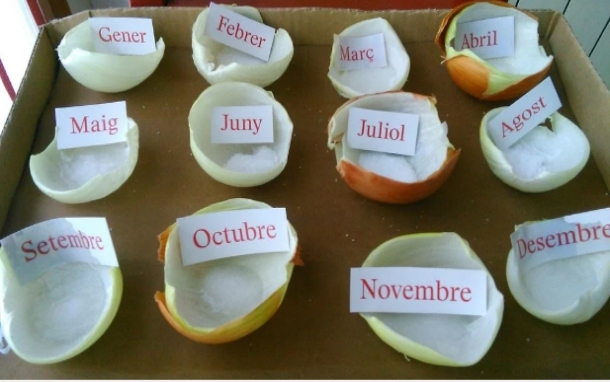Although science and technological advances in meteorology and weather forecasting today are advanced, the “Onion Calendar” is still relevant in our time.
It is a long-standing custom that, although far from science, is used by farmers to get close to the earth and predict the weather for the coming year.
Although technology through smartphones provides us with daily weather conditions and forecasts, in Catalonia an onion can announce the weather for the whole year.
The Weather Calendar or “Onion Calendar”.
This calendar is a custom practiced in the Catalan countryside. They use an onion to predict the weather for the entire year ahead.
According to this tradition, an onion is able to predict twelve months of weather.
How does the system work? It’s simple: shortly before the beginning of New Year’s Eve, cut a white onion in half and separate twelve layers from it (each layer corresponds to a month of the year).
They are then left outdoors with a small amount of salt in each layer.
Just on New Year’s morning, the state of the layers is observed. Those that have accumulated more water will indicate the rainiest months of the year and the layers with less accumulation will indicate the driest periods.
It should be noted that the result obtained is only valid for the area where the experiment was carried out.
Explanation of the method
Whether this tradition is of peasant or pagan origin, the “Onion Calendar” has an explanation.
The application of this method indicates that the smallest layers of the onion correspond to the first months of the year, as well as the first months of summer.
And the thickest ones correspond to the rainiest months in spring and autumn.
For its part, the salt fulfills its function: it concentrates the water present in the onion. Therefore, the thicker and fleshier layers (which accumulate more water) are the ones that release more liquid when in contact with salt.
From these observations we obtain a calendar that corresponds to the climatology.
While it is not quite possible to confirm the exact reliability of this method of rural forecasting, it is clear that traditional weather forecasting is not completely accurate either.
In the end, nothing is lost. Just have an onion, cut it and wait for the next day to see what it indicates.
The Catalan saying goes: “La ceba de Cap d’Any fa bon averany” (“the onion at the end of the year is a good omen”). Traditions have not disappeared.

